Gaza - counterproduktive blockade
Israel's treatment of people in the ockupied areas, i.e. the Palestinian territories of West Bank and Gaza, borders to how the former Apartheid regime of South Africa treated it's black population. Through extrajudicial killings, barriers, confiscations of private property, incarcerations without trial, discrimination...the Palestinians are opressed solely for beeing Arabs and not Jews.
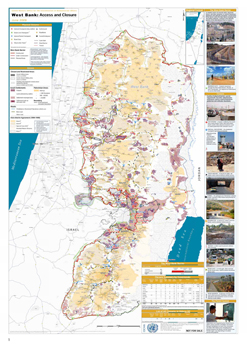
Blue and grey areas show Jewish settlements and enclosures on the West Bank where Palestinians cannot enter, significantly reducing their possibility to travel. "The Wall" which aims at protecting Israel proper from terrorist attacks are mainly erected inside Palestinian areas (the Green Line). Map from UN OCHA.
Israel has according to international law, responsibility to provide the population in the occupied areas descent living conditions, including rights to education, prosperity and so forth, but Israel does not recognize the occupation as such. But it claims it has a right to control by military force large areas of the West Bank and put the Gaza strip under blockade.
The obvious result from decades of opression of the Palestinians is desperation and a strengthening of the extremists within Hamas and Hezbollah. Any will to make consessions to Israel to reach a peace deal evaporates. But this serves the interests of extremists on both sides. Jewish zionist extremists are dependant on a threath against their own existence to remain at power. What is counterproductive for us, is productive for them....
Unfortunately the one-sided Jewish view enjoys huge support among Christians in the West, unable in their religious feelings to see beyond their distrust towards Islam and realize that even Arabs and Palestinians in the end are also human beeings with a right to exist and live.
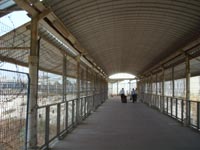
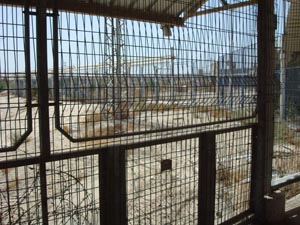
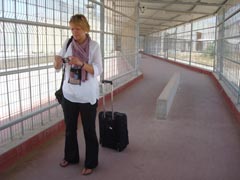
Erez border crossing, entrance from Israel to Open Air Prison Gaza
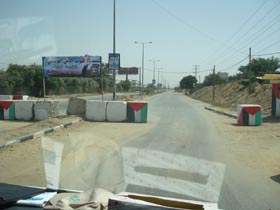
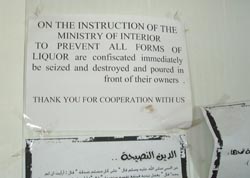
This is where Hamas-territory starts. All alcoholic beverages are confiscated
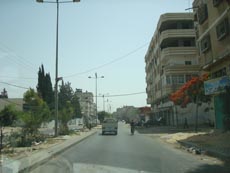
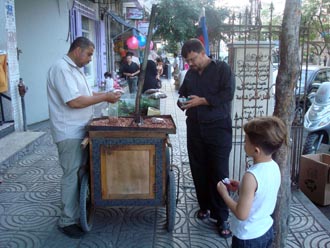
Goods not allowed by Israel, i.e. most of them... is laboriously brought into Gaza through tunnels under the Egyptian border in the south. Hamas controls the tunnels and charges revenues and thus strengthens it's resources. That makes prices sky-high and as a side-effect that Israeli producers loose a large market. The Palestinians have no ability any more to cross the border to work in Israel so unemloyment as well as desperation inside Gaza is enormous.
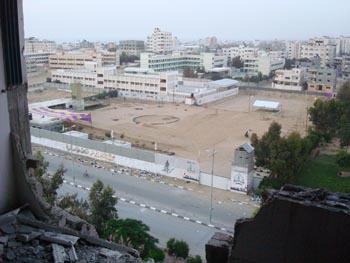
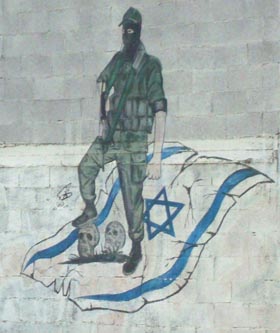
In despair and hopelessness, and after hundreds of broken peace-deals, Palestinians see no other way than violence. In Gaza Hamas has their military training grounds and funds for weapons and soldier's wages are gladly accepted from the Iranian regime. Training methods as well as technics for production of rockets are easily sent by email. This is well known to Israel, whose intelligence services keep thousands of informers inside Gaza. When Hamas crosses the border to the "unacceptable", Israel attacks with extrajudicial killings, attacking by drones or air force, executing people.
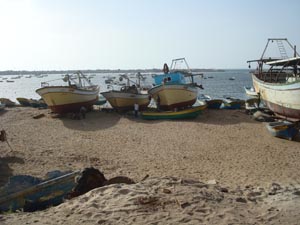
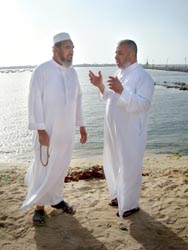
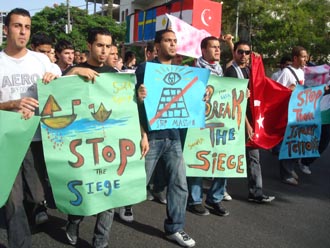
Demonstration against the blockade days after the deadly attack against the "Freedom Flotilla", 31st of May 2010
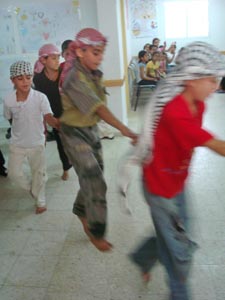
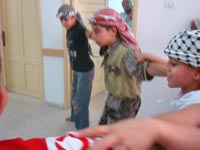
The Palestinska cultural heritage is kept alive. Children dancing in a day-center.
--------------------------------------------------------------------------------------------------------------------------------
facts from UN (IRIN):
MIDDLE EAST: Palestinian refugee factbox/timeline
MADRID, 22 June 2010 (IRIN) - International attention has
been focused on the Palestinian question in recent weeks in the wake of Israeli
military actions against marine activists trying to deliver aid to the Gaza
Strip and recent Israeli moves to ease the blockade. IRIN takes a fresh look
at the background.
The total number of displaced Palestinians worldwide is 7.1 million, including:
6.6 million refugees, and
427,000 internally displaced persons (IDPs)
67 percent of all Palestinians worldwide are refugees or IDPs
4,766,670 refugees registered with the UNRWA
UNRWA definition of Palestinian refugees: "People whose normal place
of residence was Palestine between June 1946 and May 1948, who lost both their
homes and means of livelihood as a result of the 1948 Arab-Israeli conflict."
As a rule, those displaced after 1948 do not qualify for UNRWA assistance
More than one million refugees whose displacement dates back to 1947-1948
are not registered with UNRWA
340,016 Palestinians are registered with UNHCR
(Sources: BADIL [http://www.badil.org/],UNRWA [http://www.unrwa.org/] and
UNHCR [http://www.unhcr.org/])
TIMELINE
- 29 November 1947: By approving Resolution 181 [http://daccess-dds-ny.un.org/doc/RESOLUTION/GEN/NR0/038/88/IMG/NR003888.pdf?OpenElement],
the UN General Assembly adopted a plan to partition the 1923-48 British Mandate
of Palestine.
- November 1947-July 1949: War in the British Mandate of Palestine led to
the flight of over 720,000 Palestinians, according to the UN. Non-UN estimates
for the number of refugees displaced in 1948 range from 400,000 to almost
one million.
- 9 April 1948: The Deir Yassin massacre just outside Jerusalem in which over
100 Palestinians were killed, shocked civilian Palestinian populations throughout
the British Mandate of Palestine
- 11 December 1948: By issuing Resolution 194 [http://daccess-ods.un.org/TMP/3545365.html],
the UN General Assembly recognized the Palestinian refugees' right to return
to their homes. To date, this resolution has not been implemented.
- 14 May 1948 - July 1949: Hours after British withdrawal from the British
Mandate of Palestine on 14 May 1948, the state of Israel was declared on 78
percent of that territory. Following the Arab rejection of the UN Partition
Plan to divide Palestine between Jews and Arabs, Syria, Lebanon, Jordan, Egypt
and Iraq invaded Israel.
- July 1949: Israel reached armistice agreements with Syria, Lebanon, Jordan
and Egypt.
- 1 May 1950: UNRWA began its field operations.
- 5-10 June 1967: War broke out between Israel and Egypt, Syria and Jordan.
As a result of the conflict, an additional 100,000-300,000 Palestinians became
displaced.
- 1967-present day: Estimates vary greatly on the annual rate of new displacements,
but Palestinian sources cite up to 20,000 newly displaced persons per year.
Reasons for new displacement include Israel's construction of a separation
barrier in the West Bank and Jerusalem, the construction of illegal Jewish
settlements in the occupied West Bank, the revocation of residency rights
and house demolitions.
(Sources: BADIL, UNRWA, Israeli Ministry of Foreign Affairs [http://www.mfa.gov.il/MFA]
and The Institute for Middle East Understanding [http://www.imeu.net/])
Gaza
An estimated 1.1 million Palestinians out of Gaza's 1.5 million population
are UNRWA-registered refugees.
There are eight UNRWA-administered camps in the Gaza Strip.
As a result of Israel's occupation since 1967 and an ongoing blockade on the
Gaza Strip, the population suffers severe economic problems.
UNRWA's activities in the Gaza Strip have been severely restricted by the
blockade.
Military conflict, including Israel's 23-day military offensive starting 27
December 2008, has led to the frequent destruction of homes and other infrastructure
in Gaza, much of which has not been rebuilt because of the blockade.
Click here [http://www.unrwa.org/etemplate.php?id=64] for more information
on UNRWA's operations in Gaza.
(Source: UNRWA)
West Bank
779,000 Palestinians are registered with UNRWA.
There are 19 overcrowded and poorly serviced camps.
The ongoing occupation and military checkpoints and closures implemented by
the Israeli army put a huge strain on the West Bank economy.
Click here [http://www.unrwa.org/etemplate.php?id=67] for more information
on UNRWA's operations in the West Bank.
(Source: UNRWA)
Israel
Palestinians whose forbears were displaced in 1948 but remained within the
borders of what is now Israel are estimated to number 335,204.
They have the right to Israeli citizenship but are denied the right to return
to their home towns or villages.
(Source: BADIL)
UNRWA versus UNHCR
Such is the scale and uniqueness of the Palestinian refugee problem that the
UN has one agency for Palestinian refugees alone and another for all other
refugees across the world.
After the 1948 Arab-Israeli conflict, the UN Relief and Works Agency for Palestine
Refugees in the Near East (UNRWA) was established by the UN General Assembly
on 8 December 1949 "to carry out direct relief and works programmes for
Palestine refugees".
UNRWA began operations on 1 May 1950 and because no solution to the Palestine
refugee problem has been forthcoming, the General Assembly has repeatedly
renewed UNRWA's mandate, most recently extending it until 30 June 2011.
The UN Refugee Agency (UNHCR) was established on 14 December 1950 to help
Europeans displaced by World War II. It is mandated to "to lead and co-ordinate
international action to protect refugees and resolve refugee problems worldwide".
The BADIL Resource Centre for Palestinian Residency and Refugee Rights describes
the situation of Palestinian refugees and internally displaced persons (IDPs)
as "the largest and longest-standing case of displaced persons in the
world today."
--------------------------------------------------------------------------------------------
Copyright:
Lennart Berggren / Axiom Film 2010
--------------------------------------------------------
tillbaka hem back to homepage
Axiom Film&TV
mobile phone + 46 708 103890
email: mail(emailsymbol)axiomfilm.com